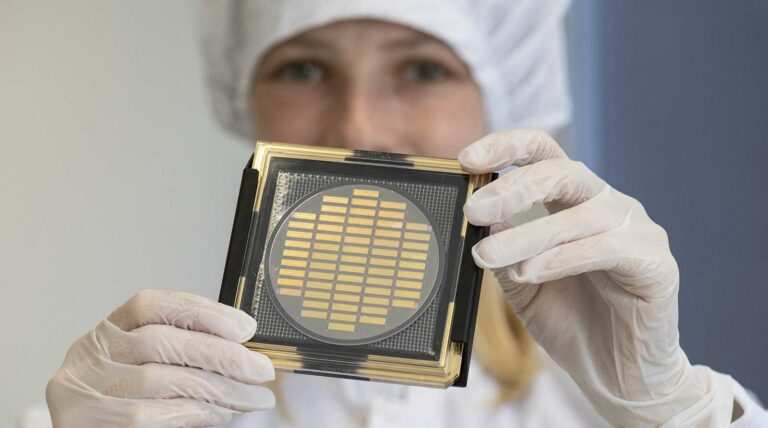
As the Senate takes up its version of the annual defense policy bill this week, one of the provisions tucked into the legislation would boost funding for U.S. quantum computing efforts.
The Senate’s version of the National Defense Authorization Act would add $100 million on top of the $430 million the Pentagon sought for information and communications technology programs.
In explaining the need for the extra money, the report accompanying the Senate bill said the funds would go toward “acceleration of the deployment of large-scale quantum computing systems to help ensure the United States remains the world leader in quantum computing capabilities.”
The money would go to the Defense Advanced Research Projects Agency, or DARPA, and the legislation asks the agency’s director to “make one or more large awards to entities who present credible plans for development of functioning large scale quantum computing systems.” The House version of the defense bill doesn’t have a matching provision for quantum computing, and the subject would have to be addressed during conference negotiations between the two chambers.
The goal of accelerating U.S. quantum computing efforts comes as experts worry that China is investing significant resources and aims to become a global leader in the technology. Quantum computers process information differently from traditional computers and are capable of solving some problems much more efficiently than normal computers.
Whichever country gains the upper hand in quantum computing could obtain significant advantages, such as faster drug discovery, speedier development of high-performance materials, and the ability to break encrypted signals and messages for espionage and other purposes. While regular computing involves storing information by encoding data in bits, with each bit being either a zero or a one, quantum computing exploits laws of physics at a very small scale to store two values at the same time.
A recent report by the consulting firm Booz Allen Hamilton titled “Chinese Threats in the Quantum Era” likened classical computers to the traditional light switch, which is either on or off. But quantum computers operate on a principle similar to a dimmable light switch, the report said. A quantum computer stores information in a qubit, which “can store up to two values at the same time, encoded as degrees of on-off,” the report stated.
While quantum computers are still largely in research labs and at least a decade away from being ready for wider use, the race for supremacy is on, the Booz Allen report said.
For the past five years, China has poured resources into quantum computing research, and while the country is still behind the United States, Beijing aims to surpass Washington by the mid-2020s, according to Booz Allen.
Fully functional quantum computers could be vastly more powerful than today’s supercomputers and could lead to highly classified data and information stored in encrypted forms being pried open. While China is unlikely to possess such computing technologies by the end of the decade, Beijing’s goal of getting there poses a risk, Booz Allen said.
“The outsized threat of a rival state possessing the ability to rapidly decrypt any data using current public-key encryption generates high risk,” the report said. “Encrypted data with intelligence longevity, like biometric markers, covert intelligence officer and source identities, Social Security numbers, and weapons’ designs, may be increasingly stolen under the expectation that they can eventually be decrypted.”
Quantum computing is only one of the many areas of research underway to exploit properties of quantum mechanics.
The U.S. National Science Foundation lists quantum leap as one of its top 10 areas of focus. “Many of today’s technologies — lasers, computers, GPS and LEDs among them — rely on the interaction of matter and energy at extremely small and discrete dimensions,” according to the NSF.
“Researchers need understanding of quantum mechanics to observe, manipulate and control the behavior of particles and energy at dimensions at least a million times smaller than the width of a human hair,” according to the NSF. The resulting understanding could lead to “next-generation technologies for sensing, computing, modeling and communicating,” the NSF says on its website.
To advance research in quantum science, the NSF launched the Quantum Leap Challenges Institute in 2020. The NSF in September announced two new institutes, including one for quantum sensing in biophysics and bioengineering.
Led by the University of Chicago, the biosensing effort “will identify novel biological quantum sensing systems and develop next-generation tools for observation and discovery,” the NSF stated.
Beijing has similar goals, the U.S.-China Economic and Security Review Commission said in its annual report to Congress.
Under President Xi Jinping’s direction, Beijing is accelerating work on quantum computing research, as well as work on artificial intelligence, synthetic biology, cloud computing and development of its own digital currency, the commission said in its report.
“China’s leaders believe they can rely on the domestic development of emerging technologies not only to address long-term structural challenges such as falling productivity growth, demographic decline, and environmental degradation but also to strengthen [Communist] Party control and stability while reducing dependency on foreign technology and products,” the commission report stated.
The post Quantum computing would get boost in Senate defense bill appeared first on Roll Call.
___
© 2021 CQ-Roll Call, Inc Distributed by Tribune Content Agency, LLC
0 comments :
Post a Comment